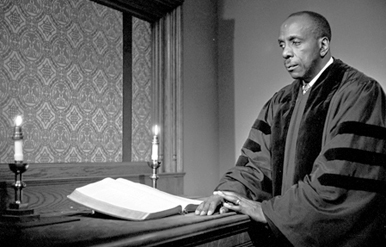
A sermon discussing the interpretive principles of the fourth century desert father Evagrius and the twentieth century theologian Howard Thurman.

A sermon discussing the interpretive principles of the fourth century desert father Evagrius and the twentieth century theologian Howard Thurman.
The following sermon was preached on September 15th of this year. This week marked the anniversary of 9/11 and the Feast day of Harry Thacker Burleigh, the greatest African-American composer and arranger of the black spiritual tradition. This Sunday also marks the Feast of Our Lady of Sorrows in the Roman Catholic tradition and who is celebrated within the black spiritual Weeping Mary sung most famously by Paul Robeson. In our worship, we looked forward in hope and joy with Mavis Staples, our nations finest singer of both gospel and soul from within the black church tradition. Her arrival for a concert in Cleveland this week gave us added encouragement to find our joy even within what she and her beloved father Pops Staples call ‘the heavy.” Sha la boom boom yeah!

Sister Mavis shows us the face of one steeped in joy and intimate with sorrow. As we say in the church, the icon of the face of Christ and his Mother Mary.
(Apologies for the poor sound quality. I preach on the floor, not the pulpit and the microphone is not as close as desireable. And, as always, when preaching without notes, mistakes are made. Dvorak was Czech for example, not Hungarian. But as I remarked in the sermon following the great African theologian St. Augustine, our mistakes are only another way for the one we call our Higher Power to show that power even in our weakness.)
In my new job as an addiction recovery chaplain, one of the first themes we have explored in chapel was that of the need for trust. For reasons that I think will need a book to work out, my own thoughts on this topic draw me continually to the subject of birds, in particular, sandhill cranes. This is a snippet of some draft notes for that book.
Most of my friends know by now of my deep and passionate love of a pair of sandhill cranes that reside in a marsh here in Medina County. I named them Gene and Grace (Kelly) for a number of reasons. Cranes are renowned for their remarkable dancing and for me the image of Gene Kelly dancing in the rain is one that fills me with great joy, especially knowing that he had a high fever on the day he shot that iconic dance scene. Also, one of my best friends in college, one who listened with amazing attentiveness to me as I struggled with my own wounds is also named Eugene, or Gene as we called him then. Naming animals is a tricky thing, but usually they have a way of letting you know if you’ve got it right.

Gene dancing up a storm
Grace lost the bottom part of her leg this spring in an accident and now relies even more upon her partner Gene to keep watch for her and the potential enemies she is less able to defend herself from. As I watched her bow down low on one leg to forage for food, I was struck by the gracefulness of her movements and the name Grace seems most fitting as I thought of the slow moving beauty and resilient strength of the iconic Grace Kelly.

Grace preening on one leg. How could she not be Grace?
Cranes are the oldest species of bird known. They have been revered by all cultures, civilizations, and religious traditions where they reside, including the Buddhist, native American, African, and Christian traditions.
Cranes typically mate for life and are fiercely loyal to one another. Both the male and female take time to sit on the nest while the other keeps guard and gets some food. Because Grace lost part of her leg this spring, they were unable to produce any offspring. Grace struggles somewhat to forage, and when she does, she is more vulnerable since she can’t use one of the bird’s best defenses, a strong kick. Gene is always by her side. Always. And when she bends down to eat, he is usually scanning the horizon for any threats. This is trustworthy love in action. We are all wounded in ways, but some are more vulnerable than others and one way to think of prayer or spiritual practice is as attentiveness to the vulnerable heart of another. This is Gene in action.

Gene on the lookout while Grace gets a breakfast of soybeans in a field near their marsh home
In the Christian tradition cranes are revered for their prayerful attentiveness. It was believed that, like monks in a monastery, or residential staff in a recovery center, it was crucial for there to be one or two cranes who stayed awake all night to insure the safety of the rest. Cranes are known for sleeping on one leg. In the medieval imagination, it was believed that the other leg held a large rock, symbolizing the rock of Christ, which, if the guardian bird were to accidentally fall asleep, would hit the ground with a loud thud and awaken the birds to their danger. These verses from the First Epistle of Peter were likely in the monks minds when the imagined the cranes this way:
Cast all your anxiety on him, because he cares for you. Be sober. Be Watchful. Your adversary the devil prowls around like a roaring lion, seeking someone to devour. Resist him, steadfast in your faith, for you know that your brothers and sisters in all the world are undergoing the same kinds of suffering.

Here are snippets from two sermons speaking of their qualities and an icon from a medieval Christian bestiary. Theologian birdwatchers have been drawn to their watchfulness, one of the most important qualities in a strong prayer life. Though their ornithological accuracy may be in doubt in the thoughts, Isidore and St. Antony are surely on to something by seeing that our own attentiveness to the virtues of natural world have much to teach us. By their faithful presence to one another day after day, Gene and Grace have taught me a great deal about how to be a trustworthy partner to those I love. And they have taught me one way to think about what it means to pray without ceasing.
Isidore of Seville [7th century CE] (Etymologies, Book 12, 7:14-15): Cranes (grues) take their name from the murmuring sound they make. When they are travelling somewhere they follow the letters of the alphabet. They fly at great altitude so they can see the lands they seek. The leader in flight maintains the line of birds with its voice; when it grows hoarse another bird takes its place. At night they take turns acting as guard; the one on duty holds a small stone in its claws to hold off sleep, and cries out at anything to be feared. Their age is revealed by their color, because the darken as they grow old.
St Antony of Padua [12th-13th century CE] (Sermons): Merciful men compared to cranes. Let us, therefore, be merciful, and imitate the cranes, who, when they set off for their appointed place, fly up to some lofty eminence, in order that they may obtain a view of the lands which they are going to pass. The leader of the band goes before them, chastises those that fly too slowly, and keeps together the troop by his cry. As soon as he becomes hoarse, another takes his place; and all have the same care for those that are weary; so that if any one is unable to fly, the rest gather together, and bear him up till he recovers his strength. Nor do they take less care of each other when they are on the ground. They divide the night into watches, so that there may be a diligent care over all. Those that watch hold a weight in one of their claws, so that, if they happen to sleep, it falls on the ground and makes a noise, and thus convicts them of somnolency. Let us, therefore, be merciful as the cranes; that, placing ourselves on a lofty watch-tower in this life, we may look out both for ourselves and for others, may lead those that are ignorant of the way, and may chastise the slothful and negligent by our exhortations. Let us succeed alternately to labour. Let us carry the weak and infirm, that they faint not in the way. In the watches of the night, let us keep vigil to the Lord, by prayer and contemplation.
“To despair over one’s sin indicates that sin has become or wants to be internally consistent. It wants nothing to do with the good, does not want to be so weak as to listen occasionally to other talk. No, it insists on listening only to itself, on having dealings only with itself; it closes itself up within itself, indeed, locks itself inside one more inclosure, and protects itself against every attack or pursuit by the good by despairing over sin.” —The Sickness Unto Death
So we must prune the rank and sordid overgrowth of sin by nourishing the lilies of the valley even in the shadow of death.
The following reflection came in response to an online discussion by a group of Episcopalians about a bishop of the church’s statement that Robin Williams’ death by suicide was selfish. This is very delicate territory, so I advise readers to be gentle with themselves if they choose to read. It is not usually helpful to think that there is a ‘wrong’ response to such a trauma–nor do I think the bishop in question is wrong in his expressions of anger and anguish, feelings that so many of us have felt about the loss of a brother (Williams was Episcopalian). In fact, I admire him for his bravery in speaking from his heart.
Is suicide selfish? The question itself puts the matter immediately into the realm of moral theology, which is where the church has often put it. But I wonder if there’s a better way. Christian thought has often struggled with dualistic assumptions regarding the mind and the body, with the mind thought to be something completely other than the flesh and not subject to its limitations.
Recent work in neurobiology has challenged this assumption. The brain is of course a part of the body, and our thoughts are themselves inextricably bound to our bodily states. This is something the desert monks knew as well as today’s neurobiologists and body-oriented psychotherapists, of course, but alas, it is too often forgotten. Ravaging physical illness can lead the mind astray, and severe depression can leave the body utterly listless and undone. Read the rest of this entry »
It’s always a joy when my girls decide its time to ‘do some theology.’ Last night at the dinner table we began to discuss the meaning of our dreams. My eldest offered a theory that these were unsifted thoughts in the backs of our minds that came out under cover of night. Egads, has she been reading Freud?
After the kids indulged their daddy’s thumbnail sketch of Freud’s theory of the unconscious (structured like a language as I explained!), we laughed a bit about our nightmares. Alligators, kidnappings, and worse, even the three year old has nightmares, of big foxes who won’t let him out of his room!
Snuggles and stories ensued, and the old Bob Dylan line came to mind, ‘Those dreams are only in your head.’ But the truth is, that’s precisely the problem. Many of us have recurring dreams, or nightmares, ones that cling to us in the early waking hours and can haunt us throughout the day. We wake up feeling ‘blue’ sometimes, not even aware of the power a forgotten dream is having on us.
The early church knew of this dangerous power of dreams, Augustine warning us that dreams can be of God (as in Daniel or Jacob’s ladder), but also of the devil. He even thought that nightmares were proof that hell existed, and that it would be like a nightmare from which we never awake.
Thanks Augustine! In any case, because our sleeping hours make us vulnerable to unbidden thoughts, some of which can do us serious harm, the desert monks committed themselves to daily prayer. Compline, right before bed, has prayers for a peaceful night’s rest, a version of which I always do with the kids,
And morning prayer begins with a turning toward God and a thanksgiving for the new day. The monks knew these prayers to be therapeutic, in that they are a deliberate effort to turn our minds, which may have been assaulted by dark thoughts the night before, back toward the loving grace of God. “New every morning, is thy love,” as the wonderful John Keble hymn for morning has us sing. That’s a particularly good way to begin the day, in song.
Resolve: Remembering that my mind is vulnerable to thoughts I do not control or even want, I will turn it each day to daily prayer. Even if it is only the briefest of prayers when I first wake and when I finally fall asleep, I will strive to turn my mind back to God throughout the day, trusting the mind of Christ promised to me in my baptism.
I learned a remarkable word today while reading the Shepherd of Hermas, a second century Christian text of great importance to the early church. The word is amnesikakos. Its a compound word made up of two greek words, amnesia and kakos. Amnesia is just what it sounds like: forgetfulness. Kakos is the Greek word for evil or bad. When put together, the word has the meaning of forgetting the bad, or forgiveness. Here’s how the Shepherd of Hermas uses it:
“For God is not as men who bear malice, but is himself without malice [amnesikakos], and has mercy on that which he made. Therefore purify your heart from all the vanities of this world, and from the words which were spoken to you before-hand, and ask from the Lord, and you shall receive all things, and shall not fail to obtain any of your petitions, if you ask from the Lord without doubting.”
While forgiveness is God’s very nature, our minds tend to be storing houses for hurtful comments, slights and other wounding words. By means of prayer, especially intercession and contemplative silence, we can learn to make our minds more porous, more able to release the thoughts that bind us or keep us boiling mad. Prayers for mercy may settle our minds a bit more each day.
Resolve: For today, when I find myself holding onto words that mean no good, I will turn to God in prayer–asking for my own forgiveness and for that of others. I will include in my petitions those by whom I may feel wounded, and strive to set aside time for silent prayer.
I read a troubling article today in the New York Times. The topic was trolls. Perhaps you’ve met them—these disembodied words that scroll across the pages of blogs, facebook and twitter feeds, saying the most hurtful things imaginable, as they did to Robin Williams’ daughter recently in what we can only accurately call evil.
Trolls, the article’s writer suggests, have only become worse as the internet has become more ubiquitous in our lives. They incite flame wars, inhibit genuine dialogue, sow deeper divisions than may have already been there in a difficult political or ethical discussion. They have prompted some people to quit reading good blogs, and prompted others to harm themselves or others in response to the violence inflicted by the hateful words. And trolling occurs not just on the internet, but anywhere where words are used with the aim to wound and to obfuscate the truth. We have trolls, do we not, in our own heads some of the time? Read the rest of this entry »
In ancient philosophy, there was something known as the argos logos, or the lazy argument. In essence, the lazy argument is a disorder of the mind, in which our thoughts play tricks on us, convincing us that nothing we do or will do matters at all. Though mocked by Cicero and others for its sophisty, its effects on a person can nevertheless be deadly. Using every thought at its disposal, the argos logos twists the mind into knots, convincing the person undergoing this intellectual seize, “What’s the use?” “Nothing I do matters” or “My life has no value.”
Ironically, the lazy argument is itself anything but lazy, and uses the tremendous energy of our minds to keep us running ragged from one thought to another, never allowing us to stop long enough to discern the truth. Intellectuals and keen thinkers are especially susceptible to the lazy argument for this reason, as their minds can race with tremendous speed. This is the gift of the intellectual, but it is also a danger. Depression and mania are both diseases of an unsettled and often racing mind.
The desert fathers and mothers of the eastern church knew the problem well, using frequently the Greek word for chatter, argologia. Sitting in their cells day after day, year after year, they perceived the mind at work and discerned that there was just as much danger as there was light to be found in the thoughts that swirled about them. One later writer in the desert tradition, Peter of Damaskos, contrasted the blooming confusion of his own thoughts with the penetrating simplicity of the divine word: “God’s speech is not chatter…for though we were all to speak at length, we still would not have uttered the equivalent of a single word of God.” As an example, Peter cited Deuteronomy 6:5: You shall love the Lord your God with all your heart, all your soul, and all your might.
If we made this briefest of divine words (theo-logia) truly resound in our lives, Peter marvelled, we would have the antidote to all of the useless chatter that distracts us from our highest callings. A single holy word, kept in the heart, carried about in our daily work, recited ‘when we lie down and when we arise,’ (Deut 6:7), is more than enough to guard the entryway to our heart-minds, protecting them from lazy arguments and useless words.
Resolve: For today, I will turn from the chatter both inside and outside my mind, and seek instead to hear and absorb the divine word of love in all of my activity and in all of my resting moments. When I am distracted by my mind, I will return gently to God’s word of loving mercy. Choose life. (Debut 30:19) {this post written in loving gratitude for Sister Cecilia who gave me this simple word)